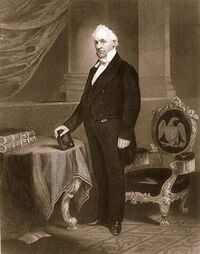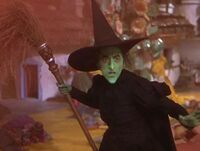James Buchanan
James "J-Buck" Buchanan, Jr. (April 23, 1791 – June 1, 1868) was the 15th U.S. President, serving from 1857 to 1861. He took office with the promise of draining a few swamps and ended up losing half the country to the Confederacy by the time he officially left the White House.
Buchanan is regarded as a Loser with a capital L. A 2014 poll of historians voted him the worst man ever to sit in the White House, though a majority demanded a re-vote in view of subsequent elections. Part of his poor reputation owes to being succeeded by Abraham Lincoln. "Honest Abe" has monuments, edifices, and giant statues in his honor, while "Fast Buck" has nothing of any importance. True, there is a dull statue of him in Washington, D.C. asleep in a chair with a book in his cold hands, but that's about it.
His signature accomplishment was the failure to talk the South into staying in the Union, then spending the rest of his time in office playing strip poker in the West Wing. He retired in 1861 rather than run again, then refused to talk to anyone until his death seven years later.
Early life[edit]
Surviving photographs show that Buchanan was a dapper gentleman, but he never married or ever "went steady" with any woman. This suggests either that he led a very private life, or that he was a homosexual. It may be a "tell" that Buchanan burned all his private letters before he died.
He was born in Cove Gap, Pennsylvania. The Buchanans were a family from Ulster that emigrated to the U.S. in 1783, settling in Mercersburg, Pennsylvania. Buchanan was nearly expelled from an academy in his hometown, but pleaded for a second chance, and was ultimately graduated in 1809 with honors in excuse-making. Fatefully, his training in pleading for a second chance would fail him when it came to the Presidency.
Political career[edit]
The same year, Buchanan moved to Lancaster, which was the state capital, and stayed there after it no longer was. He was a critic of James Madison, though it is unclear whether he was aware that all that stuff was going on in a completely different capital. He did often visit the new state capital at Harrisburg, as he was a Federalist state representative in 1814 and 1815.
Buchanan went from there to Congress. In 1824, he switched from the declining Federalists to the Democratic Party of Andrew Jackson. The Federalists supported strong government, central banks, musicals featuring Alexander Hamilton and an alliance with Great Britain. The Jacksonians believed in none of these. Buchanan slid effortlessly into the pro-slavery party.
Unusually for an American, Buchanan was well-traveled. He got a job in Moscow but left under a cloud. His political opponents alleged the Russians had kompromat on Buchanan involving male ballet dancers.
Secretary of State[edit]
Buck's next post was a big one — Secretary of State in the administration of James K. Polk. This was nearly the only other executive post besides being President; in those days, there was no Health nor Human Services. The Secretary also got a nice house and staff of slaves.
Crediting his diplomatic prowess, Buchanan gave Americans a new place to surf, by annexing California, Arizona, New Mexico and Texas off the Mexicans. In addition, the Brits surrendered most of Oregon and agreed to the 49th parallel as the new northern border.
With these claimed successes to his name, Buchanan expected to breeze in as the next President. However, his support vanished when his Democratic Party rivals spread rumors that the bachelor was a nancy. He lost and then retired to become a postman.
Ambassador to Britain[edit]
This should have been the final word on Buchanan, but in 1853, President Franklin Pierce gave him the office of Ambassador to Great Britain. It's more likely that the offer actually came from Pierce's Vice President William R. King. King and Buchanan had a reputation as the "gay pair" at a time when the word gay meant be funny rather than a badge wearing, home-dyed scarf owner now normally associated with the homosexual community.
Buchanan packed his pantaloons and arrived in London. He found the place to his liking. At this time the American embassy was essentially a rented room off Piccadilly Circus. Buchanan took it up. He also became friends with the British politicians at the time. His favorite was Viscount Palmerston. An old rake, Palmerston was a good contact for all things vice-related. Buchanan evidently had fun there and it enhanced his name back home. Then came the offer of running against Pierce? The latter was too "liberal" and Northern for Democratic Party bosses. They also knew Buchanan liked slavery.
Presidency[edit]
Buchanan defeated Pierce and his own party rivals. He then defeated the Know Nothings (officially, the American Pie Party) and an upstart called the Republican Party, who were mostly bald after discarding their previous identity as the Whigs. Buchanan promised nothing would change and was true to his word, taking it easy once in office.
Buchanan's first inauguration was delayed, because the person administering the oath was fifteen minutes late, which Buchanan assumed meant he was free to leave.
The pressing issue for the U.S. was the idea that a state could "go slave" by majority vote. Moreover, ever since the Dred Scott decision in 1857, any African American had to prove he was legally free by producing a current horse-riding license and a tax receipt. The South celebrated Dred Scott with lynchings and barbecues (often concurrent). The North feared the slave South would invade and fit them all for shackles.
Amid all this, Buchanan did and said nothing. His own party had essentially split into factions. Buchanan tried to tell everyone that he was with "them" and then sat back on the White House veranda. This growing political chaos got up the hackles of a hack named John Brown. The bearded fanatic attempted to blow up Harper's Ferry (as he had shares in a Harper's Bridge to be built in its place). Brown was captured, shaved and executed. Buchanan insisted that barbering was a state issue and not a federal one.
The same went for "Bleeding" Kansas, a classic Good vs. Evil battle over the ownership rights to the resident Munchkins. The Wicked Witch alliance (West and East) supported enchanted servitude while the Good Witch of the North promoted liberty and fairy dust. Buchanan sent a wizard to work out a compromise.
Foreign policy[edit]
Buchanan saw himself as a man of the world and America's destiny as annexing more of it. His presidency would continue the expansion of the 1840s. Now he wanted to annex all of Mexico as a super colony and buy/steal/invade Cuba from Spain. Southerners clamored to extend slavery to states around the Gulf of Mexico, arguing that the system that worked so well for African Americans would go even better on Hispanics.
Therefore, Buchanan devised a "Caribbean Strategy" that targeted all former Spanish colonies, as well as anywhere the British, French, Dutch and Danish were unwilling to hold onto. In the bargain, Buchanan added Alaska as a possible buy from Russia. This at least gave the appearance that he was doing something in the White House.
None of these plans came to pass. There were some minor island/coastline swaps not involving the U.S. The Russians rejected the bid for Alaska and reminded Buchanan that they had some interesting drawings they were willing to release to the New York Times of Buchanan's time in St. Petersburg. Buchanan backed off.
1860 and break-up[edit]
Buchanan spread word that he would be willing to run again as the Democrats' unity candidate. Democrats were united that this idea was awful. Instead, they gave voters two versions of the party: the Yankee Democrats (Stephen A. Douglas) and the Dixie Democrats (John C. Breckinridge — Buchanan's VP, whom he had locked away in a cupboard for four years). The Republicans chose Abraham Lincoln, while a last-minute botch job called the Constitutional Union proposed John Bell, a former Whig. Buchanan, annoyed that no one had taken him seriously, did not endorse anyone.
When it became clear Lincoln had won, Southern states started to quit the Union. Buchanan was still legally president for another four months as the official Lame Duck. He took that description to mean it wasn't his job to stop the break-up of the country. By the time Lincoln walked through the door, the White House was a scene of utter bachelor sloth: piles of unwashed dishes in the sink and long johns draped all over the place. The smell of cheap aftershave lingered on for years. Buchanan eventually left the building in a rolled-up carpet (a reverse Cleopatra). His last act as president was to send Judy Garland to Kansas.
Retirement[edit]
Many of Buchanan's colleagues headed south to support the Confederacy. Buchanan remained in the North. Lincoln paid "Old Buck" a pension to keep quiet. Buchanan kept his end of the bargain.
| Preceded by: Franklin Pierce |
U.S. President 1857–1861 |
Succeeded by: Abraham Lincoln |



